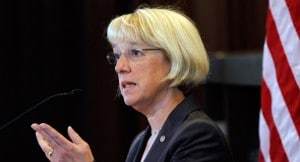Sen. Patty Murray is chosen as a leader of deficit panel
August 10, 2011
 New York Times— Senator Patty Murray, Democrat of Washington, will be co-chairwoman of a powerful new Congressional committee that is supposed to recommend at least $1.5 trillion of additional deficit-reduction measures, the Senate majority leader announced Tuesday.
New York Times— Senator Patty Murray, Democrat of Washington, will be co-chairwoman of a powerful new Congressional committee that is supposed to recommend at least $1.5 trillion of additional deficit-reduction measures, the Senate majority leader announced Tuesday.
The leader, Senator Harry Reid, Democrat of Nevada, also appointed two other Democratic senators, Max Baucus of Montana and John Kerry of Massachusetts, to the panel.
Mr. Baucus is chairman of the Finance Committee, which has authority overMedicare, Medicaid and taxes — three prime areas of attention for the new 12-member panel, the Joint Select Committee on Deficit Reduction.
Mr. Kerry, the Democrats’ presidential nominee in 2004, is chairman of the Foreign Relations Committee.
Mrs. Murray, who won a tough re-election race last year, is a member of the Senate Democratic leadership, the Senate Appropriations Committee and the Budget Committee. Her selection raised eyebrows among Republicans because she is also chairwoman of the Senate Democrats’ campaign arm, the Democratic Senatorial Campaign Committee.
In that role, Mrs. Murray recently attacked Republican candidates, saying they wanted to turn Medicare “into a voucher program run by for-profit insurance companies in order to pay for more giveaways to oil companies and the very rich.”
Mr. Reid said Mrs. Murray, a senator since 1993, had deep knowledge of budget issues and had shown an ability to “work across party lines.”
That skill will be useful in the joint committee, which will be evenly divided between Democrats and Republicans, with a seven-vote majority needed to make recommendations. “The world is watching the work of this committee,” Mr. Reid said.
Reince Priebus, chairman of the Republican National Committee, called on Mr. Reid to withdraw Mrs. Murray’s name.
“The select committee is no place for someone whose top priority is fund-raising and politics,” Mr. Priebus said.
The three Democratic senators named to the panel said they hoped to work with Republicans in “a balanced, pragmatic and practical way,” without “the red-hot partisanship and brinkmanship of the last months.”
